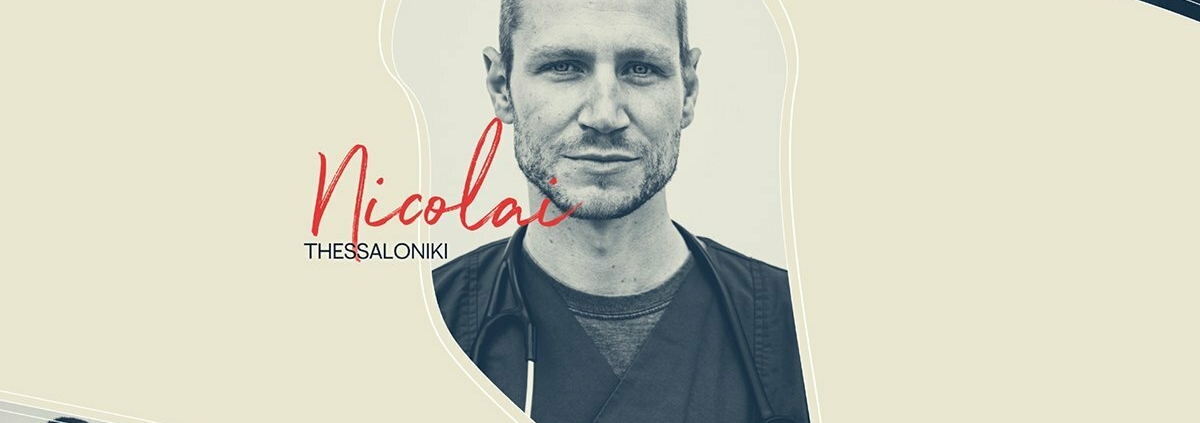“It’s important to me to see the individual person” // “What we do is not charity. Health care is a human right” “I had more confidence in the EU before.”
Nicolai Kissling recently finished his medical studies. After graduating, the medic from Hamburg decided to use his free time to volunteer in Thessaloniki for a month. He knows his efforts can’t change everything, but with his medical training, he’s eager to lend a hand where help is needed.
What made you decide to help in Thessaloniki?
I didn’t actively choose the place. I was sitting on the balcony with a neighbour who is supporting MVI and she told me about the organisation. Volunteering has always been important for me: sharing your skills with those who otherwise wouldn’t have access to care. In 2018, I had already volunteered at a hospital in Tanzania, as part of my medical training. As I was off work, I thought I could and would like to contribute again as a volunteer.
You’ve only been volunteering in Thessaloniki for a few weeks. What feeling accompanies you in the evening when you go to bed?
Lack of understanding but also anger about how undignified people are treated and the conditions they have to live in. It is a very vulnerable situation for them. I meet young, talented people here who just want to get going in their lives and are trapped here in the asylum bureaucracy. People who have experienced sometimes traumatic situations on their way to Europe. People who also live here without shelter and depend on NGOs to fulfill their most basic human rights like food and medical care. People who return from the border with injuries because they experienced violence during illegal “pushbacks.” Also elderly people and families with children, people of all different backgrounds.
It is horrible to see how people with illnesses that are actually treatable but do not receive help because they do not have access to it. The thought: ‘In Germany I would have ordered this or that now’ is very frustrating.
What was your expectations before you came here?
I didn’t have a concrete idea. But I definitely had more confidence in the EU than what I am experiencing here now. I don’t understand at all how European law can be broken under the pretext of “protecting” the EU. But we betray exactly what we stand for: Respect for the rights of every human being. Nevertheless, illegal pushbacks are the order of the day.
How is your experience of the situation for refugees in Thessaloniki at the moment?
Originally, Thessaloniki was a safe place for people in transit, or so I was told by refugees, volunteers, and coordinators who have been here for a while. After crossing the Turkish border, it was the first stop for many before moving on and trying to get further west. Those who can, now walk past Thessaloniki to the next border. Only those who have to stop because they need medical help come here. This is because attacks by right-wing extremist groups and police violence are on the rise. Life on the street is no longer safe.
What are the medical problems that people come to you with?
In the past, it was mostly wounds on the feet from long walks. This is now less, but people still come to us with open feet from walking for ten or 15 days. At home, you would tell the patient: take warm baths and rest. Here we offer wound care and try to treat infections as long as the patients are there because most of them move on as quickly as they can. In addition to the acute complaints, there are now many people who have been stranded in Thessaloniki for some time and have chronic complaints. For these patients, some with complex chronic conditions, we are often the only medical care and act as a General Practitioner. Whenever possible, we try to treat the patient ourselves. But we also write referrals for hospitals and accompany the patients, as their “advocates” so to speak, because they are often turned away in the already overburdened Greek health system. It is most difficult for undocumented refugees. They are officially not entitled to medical care.
What contribution do you want to make with your work?
Of course, I am here to provide medical help. But beyond that, I want to meet people at eye level, to listen to them, to take my time. What I often think of here is the word “dignity. I think it is important that patients know that they are seen as individuals, not as refugees, not as numbers, not as members of an ethnic group. As a human being. What we do here is not charity towards the needy. Health care is a human right. We are simply helping people here to get what they have always been entitled to.





Leave a Reply
Want to join the discussion?Feel free to contribute!